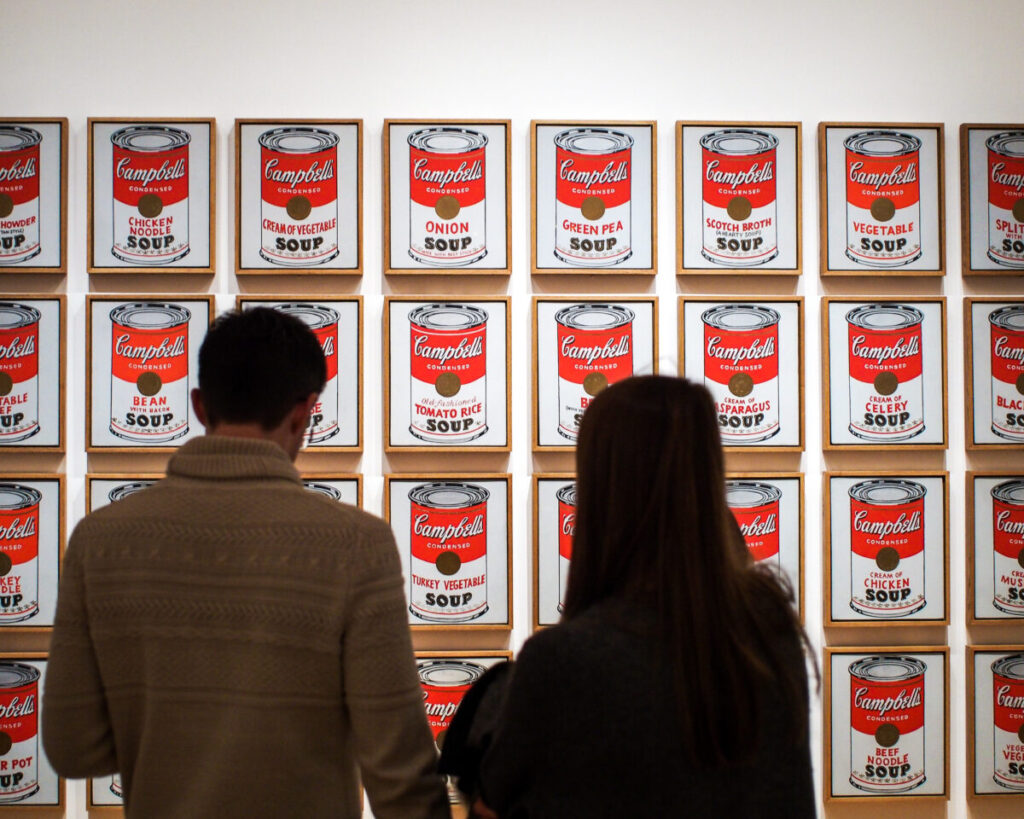
At Munich, Germany’s Pinakothek der Moderne museum—one of Europe’s finest modern art galleries, showcasing the priceless works of Pablo Picasso, Salvador Dalí, Joan Miró, Keith Haring, Max Ernst, and so on—a mysterious painting hung alongside famous paintings by Andy Warhol for eight hours.
It was hours later by the time museum staff realized it was illegally hung by one of their own—an unnamed 51-year-old employee and aspiring guerrilla artist. The museum promptly fired the employee upon learning of his prank, however the only permanent damage he did was drill two holes in the gallery wall.
The artist seemed to say to himself, “Why isn’t my art just as good?” and hung his own art without permission. The man hung his art “in the hope of achieving his artistic breakthrough”, the German newspaper Süddeutsche Zeitung first reported, citing the police as a source.
The Guardian reports that on Tuesday, the southern Germany museum confirmed that it had fired an employee from its technical services team after he was caught hanging his own painting in a part of the gallery that showcases works by Warhol, whom High Times interviewed in the August 1977 issue, as well as other famous modern and contemporary artists.
This particular artist says he just wanted people to see his art. “The employee considers himself as an artist and most likely saw his role in the museum’s installation team as a day-job to support his true calling,” a spokesperson for the Pinakothek told the Guardian.
Some things are better left unsaid: Instead of drawing more attention, the museum staff decided to just leave it up there until closing time. “The decision was made to keep the picture on display while the gallery was open and take it down after its closing time at 6:00 pm,” the spokesperson continued.
The Pinakothek decided to hide photos of his art from the public in order to discourage copycat pranksters. “All I can say is that we did not receive any positive feedback on the addition from visitors to the gallery,” the spokesperson quipped. The museum is located in Munich’s Kunstareal museum quarter, and it also showcases notable architecture and design works.
The New York Times called it a “reverse art heist,”—an act in which the artist hangs his or her own art on the wall of a museum without permission. It’s also called guerrilla art, an art form that was perfected by artists like Banksy.
The employee had access to the gallery after opening hours and so he didn’t attract any attention from security staff. He quietly installed his own 60 cm x 120 cm painting on an empty white wall in a passageway in the eastern wing’s first-floor gallery.
The incident took place on Feb. 23 but the museum did not go public with it until last Monday.
As for Warhol, when interviewed by High Times, he said many gut-busting, hilarious things, like the fact that when he gets drunk, “I tell everyone they can be on the cover of Interview.” Warhol is credited with transforming the definition of art by introducing his brand of pop art, colorful screen-printed art that could be produced at a more efficient scale, selling them for millions during his own lifetime.
The German artist in Munich left an impression, and in Warhol’s words, is getting his own “15 minutes of fame” thanks to his prank that cost him his job.
The German man is not alone, and other artists have made a name for themselves via guerrilla art, namely the anonymous artist Banksy.
Between October 2003 and May 2005, Banksy walked into some of the most highly regarded and significant museums in London and New-York in order to place some of his artworks.
He or she probably smokes weed. In one prank at The Edwardian Bristol City Art Museum in the U.K., museum-goers enjoyed participating in a game of “spot the Banksy” among the permanent collections. One such piece included a hand-painted, “clearly used hash pipe” inside a piece of pottery but plainly visible.
Banksy appears to favor hash resin: In 2003, for instance, the artist illegally hung his own art at the esteemed Tate Britain—formerly called the National Gallery of British Art—in an act he said was inspired by cannabis resin. His self-hung piece was entitled, “Crimewatch UK Has Ruined the Countryside For All of Us,” and was placed next to a 19th century landscape.
One could say that all graffiti art is guerrilla art in the sense that it’s illegal without permission. This particular artist was inspired to hang his own work and display it to the world—with or without anyone’s permission.
Read full article on High Times

